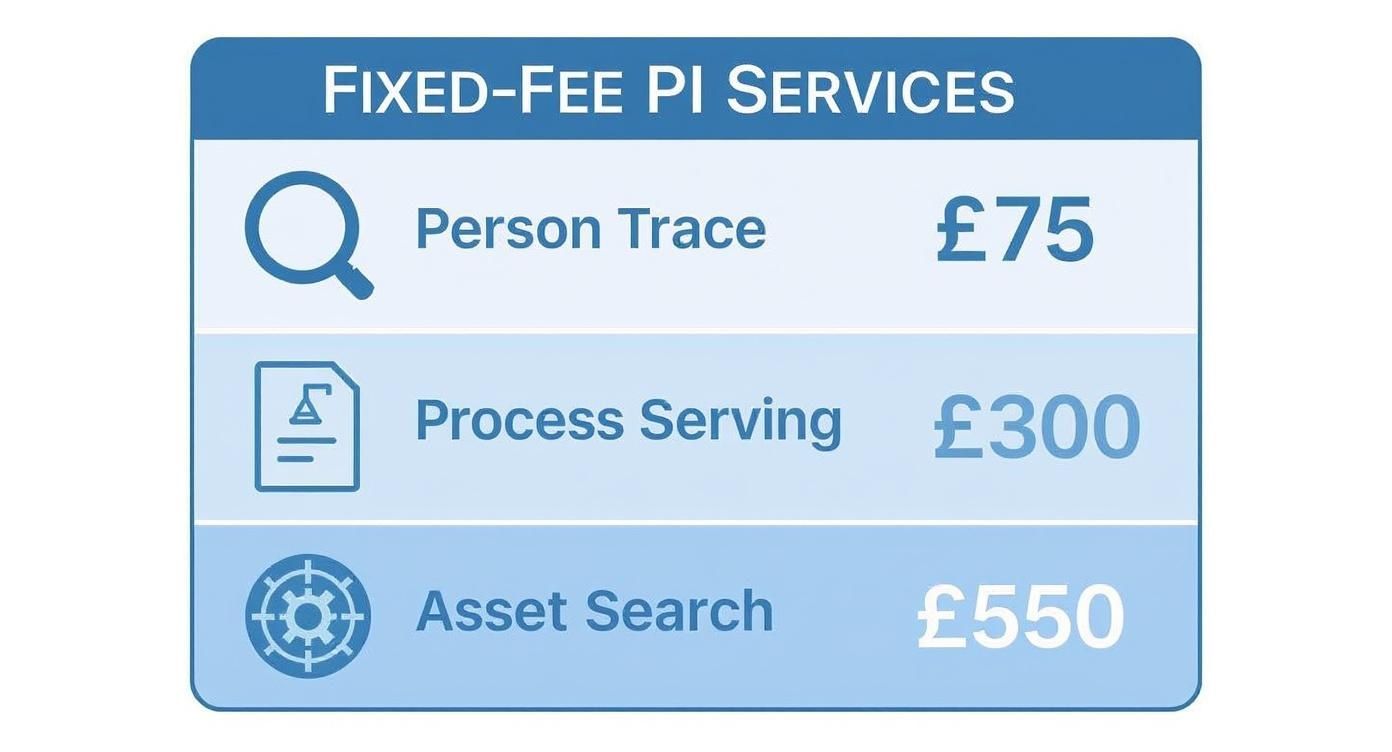If you’re wondering what it costs to hire a private detective in the UK, let’s get straight to the point. You can expect to pay between £50 and £150 per hour for most services, but the final bill depends entirely on your specific needs and how the agency structures its fees. Understanding these structures is the first step to controlling your budget.
How Much Do PIs Actually Charge?

When you need answers, understanding the potential cost is your first practical step. The world of private investigation is more transparent about pricing than you might think. Most UK agencies use one of two main models, and choosing the right one for your situation is key to getting value for your money.
The most common approach is an hourly rate. This model is best for tasks where the duration is unpredictable, such as surveillance or in-depth research. You pay for the exact time the investigator spends on your case.
Alternatively, many investigators offer fixed-fee packages for standard, well-defined tasks. This is the recommended choice for services like:
- Tracing a person with good starting information
- Conducting a basic background check
- Serving legal documents (process serving)
With a fixed fee, you know the full cost from the start, giving you complete budget certainty. It’s interesting to see how professional services structure their fees in other fields, as many follow similar principles.
Actionable Insight: Match the pricing model to your needs. If your case has many unknown variables, an hourly rate offers flexibility. If the task is straightforward, insist on a fixed fee to cap your costs.
To help you budget effectively, here’s a summary of the most common pricing models you’ll encounter.
UK Private Detective Pricing at a Glance
| Pricing Model | Typical UK Cost Range | Best For |
|---|---|---|
| Hourly Rate | £50 – £150 per hour | Surveillance, complex research, and unpredictable investigations. |
| Fixed-Fee Package | Varies by service (£350 – £2,500+) | Standard tasks like background checks, person tracing, and process serving. |
| Retainer | Agreed upfront sum (e.g., £1,000) | Long-term or corporate cases requiring ongoing investigative support. |
| Day Rate | £400 – £1,200 per day | Full-day surveillance operations or intensive, on-the-ground fieldwork. |
As you can see, there are several ways to structure payment. Your goal is to find an investigator whose pricing aligns with your specific situation and budget.
It’s also important to note that costs have risen. The average hourly rate now sits between £50 and £150, with a common figure being around £70 per hour. This is a significant increase from the £30-£60 rates seen a decade ago, reflecting the increased complexity and technological demands of modern investigations.
Once you have a handle on the financials, the next practical step is understanding the hiring process itself. Our guide on how to hire a private detective can walk you through it.
Breaking Down Hourly and Daily Private Investigator Rates

When you look into how much a private detective charges, the hourly rate is the first figure you’ll see. But to budget effectively, you must understand what that rate actually covers. The clock is often running on more than just active surveillance.
Think of it like hiring a solicitor; you’re not just paying for their time in court. You are also paying for preparation, research, and paperwork. An investigator’s billable hours are similar and can add up quickly. Your most important action is to request a clear, upfront breakdown of all billable activities before you agree to anything.
What’s Actually in an Hourly Rate?
So, what are you paying for by the hour? A professional investigator’s time is divided among several critical tasks essential for delivering the answers you need. It’s a common mistake to assume you’re only paying for the time they spend watching someone. A significant portion of the work happens behind the scenes.
Here’s what that hourly fee typically includes:
- Active Surveillance: The “boots on the ground” work of observing a person or location to gather evidence.
- Travel Time: Time spent travelling to and from surveillance locations is almost always billable.
- Research and Analysis: Desk work, including database searches, information verification, and evidence analysis.
- Report Writing: Compiling all findings, notes, and media into a professional, court-admissible report is a crucial and billable part of the service.
Actionable Insight: The biggest factor influencing the hourly rate is experience. A seasoned ex-police detective will charge more but can often solve a case faster and more efficiently, potentially saving you money in the long run.
Why Experience Justifies a Higher Price
When you see a higher hourly rate, you’re not just paying for time; you’re investing in efficiency and expertise. An experienced investigator possesses the knowledge, contacts, and legal understanding to navigate complex situations effectively. This is invaluable for sensitive cases, especially those requiring discreet and professional surveillance services.
To compare quotes like a professional, always ask for a complete breakdown of what is and isn’t included in the hourly fee. A reputable investigator will provide this transparency, empowering you to choose a professional whose price reflects the value and skill your case requires.
When Does a Fixed Fee Make More Sense?
While hourly rates offer flexibility for complex investigations, they can create budget anxiety. For straightforward, predictable jobs, a fixed-fee package is the smarter choice. This approach is ideal when an investigation has a clear start and finish point.
Think of it as ordering from a set menu versus à la carte. A fixed fee provides total cost certainty before any work begins, eliminating the stress of a running clock. This transparency is crucial for making an informed decision about how much a private detective charges for certain services.
Agencies can offer this because they have streamlined procedures for specific tasks, often using specialised databases and efficient workflows. This allows them to predict the required time and effort with high accuracy, translating into a single, upfront cost for you.
Common Fixed-Fee Services
This pricing model is widely used across the UK for a range of standard services where the objective is clear and the path to achieving it is well-defined.
Fixed fees are common for tasks like tracing individuals, running asset checks, and serving legal documents. For example, a standard UK address trace can be as low as £75, while a comprehensive asset search report might be priced at £550. Process serving, the formal delivery of official documents, typically starts around £300 plus VAT. You can find more detail on private investigator pricing structures.
Here are the most common services offered for a flat rate:
- Person Tracing: Finding a current address for an individual, such as a debtor or a long-lost relative. Providing more information upfront helps streamline this process.
- Basic Background Checks: Verifying identity, address history, and employment records. This is often used for pre-employment screening or personal peace of mind.
- Process Serving: The legal delivery of documents like court summons or divorce petitions. The fixed fee usually includes a set number of delivery attempts.
- Vehicle Tracking: Some agencies offer a fixed weekly or monthly price for renting and monitoring a GPS tracker, though this may not include installation or removal costs.
Actionable Insight: A fixed-fee package is your best option when your objective is direct, such as “find this person’s address” or “serve these papers.” It removes all guesswork from the final cost.
Before proceeding, always get a written quote that clearly itemises what the fixed fee includes and, just as importantly, what it excludes. This simple step ensures you make a smart, budget-conscious decision.
Why Do Specialised Investigations Cost More?
While hourly and fixed-fee models cover many scenarios, some cases require a higher level of expertise and resources. To accurately understand how much a private detective charges for complex services, you must look beyond standard pricing.
Think of it as commissioning a bespoke piece of furniture versus buying a flat-pack item. One is a predictable process; the other demands master craftsmanship, unique materials, and a significant time investment. High-stakes investigations operate on the same principle. These are not routine jobs; they are intricate operations that require a different calibre of resources and expertise.
Unpacking the Premium Price Tag
Several factors drive up the cost of specialised services like corporate espionage investigations, bug sweeps (Technical Surveillance Counter-Measures or TSCM), and multi-day surveillance missions.
A primary cost driver is the necessity of a team of operatives. A single agent conducting long-term surveillance in a busy urban area like central London is easily spotted. A team of three or more can work in rotation, blend in effectively, and maintain constant observation without raising suspicion.
Furthermore, these operations often require expensive, high-tech equipment, such as:
- Specialised long-range camera lenses.
- Covert communication systems for team coordination.
- Advanced GPS tracking devices.
- Sophisticated bug-sweeping equipment to detect hidden listening devices.
The price difference becomes clear when you compare these complex operations to straightforward fixed-fee services.

This visual contrast highlights the resource-intensive nature of specialised investigations compared to standardised tasks.
Cost Comparison of Standard vs Specialised Services
To put this into perspective, let’s compare the costs of standard services with their more specialised counterparts. The table below illustrates the price differences and the reasons behind them.
| Service Type | Typical UK Price Range | Key Cost Factors |
|---|---|---|
| Standard Person Trace | £75 – £250 (Fixed Fee) | Database searches, public records, minimal fieldwork. |
| Complex Missing Person | £1,000+ (Daily/Retainer) | Extensive fieldwork, interviews, travel, team deployment. |
| Basic Background Check | £150 – £500 (Fixed Fee) | Digital footprint analysis, verification of public data. |
| Corporate Due Diligence | £2,000+ (Project Based) | Financial analysis, source inquiries, on-site verification. |
| Single-Agent Surveillance | £50 – £75 per hour | One operative, basic equipment, straightforward observation. |
| Team Surveillance (TSCM) | £1,500 – £2,500 per day | Multiple agents, high-tech gear, counter-surveillance. |
The significant price increase is directly linked to the level of expertise, technology, and manpower required.
Actionable Insight: The investment in a specialised case covers more than man-hours. It funds a coordinated team with advanced technology to manage high risks and deliver legally sound evidence.
Due to these factors, a specialised investigation is considerably more expensive. For example, a full-day surveillance operation could cost £1,500 to £2,500. Other specialised services, like lie detector tests, typically start from around £750 plus VAT, as detailed in these insights from a professional PI.
Complex corporate fraud cases also fall into this premium category, demanding specific financial expertise. Our team is highly experienced in handling complex financial crimes investigations and understands the necessary resources. Ultimately, the premium price reflects the time, legal risks, and specialist skills needed to deliver results when the stakes are high.
Uncovering Hidden Costs and Extra Expenses
The initial quote you receive from a private investigator is a starting point, not the final figure. To get a realistic budget for how much a private detective charges, you must account for extra expenses that almost always arise during an investigation.
Think of it like booking a budget flight: the initial price looks good, but baggage fees and seat selection can increase the total cost. Private investigation operates similarly, with operational costs often added to the investigator’s time. A reputable investigator will be transparent about these potential extras, and it’s your job to ask about them upfront to avoid surprises.
Common Extra Charges to Expect
While every case is unique, certain expenses are standard in most fieldwork. These are not hidden fees but necessary operational costs incurred while working on your behalf.
Here are the most common add-ons to budget for:
- Mileage and Travel: Expect a per-mile charge for vehicle use. For longer distances, train fares or even flights might be required.
- Accommodation: For multi-day surveillance or cases far from the agency’s base, overnight hotel stays are often a necessary expense.
- Database and Record Fees: Accessing specialised commercial databases or obtaining official documents from courts incurs fees, which are passed on to you.
- Evidence Preparation: If the case goes to court, costs may arise for preparing an evidence bundle, including printing, video editing, and creating sworn statements.
- Specialised Services: An investigation may require a specific tool like a lie detector test. It’s wise to understand the separate cost of a polygraph test, as this is a distinct service with its own pricing.
Questions to Ask Before You Hire
To achieve full clarity and maintain control of your budget, you must ask the right questions before you commit. This ensures you and your investigator are aligned on all potential costs from the very beginning.
Actionable Insight: The most effective way to manage your budget is to demand full transparency. Do not hesitate to ask detailed questions about what is and isn’t included in the quote.
Before you hire anyone, get clear answers to these critical questions:
- Is travel time included in your hourly/daily rate?
- What is your mileage rate, and what other travel expenses should I anticipate?
- Are fees for database searches and official records included, or will they be billed separately?
- If an overnight stay is necessary, how are accommodation and subsistence costs handled?
- What are the charges for preparing reports, evidence binders, or court appearances?
Asking these questions empowers you to compare quotes accurately and ensures the price you agree on is the price you pay.
How Your Location Impacts the Final Price
It’s no surprise that your location in the UK significantly affects what you’ll pay for a private investigator. Just as the cost of living varies, so does the price of investigative services. A case in a major city will almost always be more expensive than the same job in a rural area.
This price difference isn’t arbitrary; it reflects fundamental business realities. An investigator in central London or Birmingham faces higher rents, wages, and operational costs. These overheads are naturally factored into their rates.
The Urban Premium Explained
The principle of supply and demand also applies. Major cities have a higher concentration of commercial and personal activity, leading to greater demand for investigative work. This allows city-based PIs to command higher fees.
Furthermore, urban clients, such as corporate law firms, often have larger budgets, which tends to drive up the average price across the board.
Actionable Insight: You can expect to pay 30-50% more for the same surveillance job in a major city compared to a less populated area. Factor this into your budget from the start.
For example, an eight-hour surveillance day might cost £450 in a provincial town but could easily exceed £650 in London. For a detailed breakdown, explore the specific costs of private investigators in London.
You can use this knowledge to your advantage. If your investigation is on the outskirts of a major city, get quotes from reputable agencies in a neighbouring, less expensive county. Even with travel costs included, you might find their final bill is substantially lower than that of a city-centre firm.
Got Questions About Private Detective Costs? Let’s Get Them Answered
It’s smart to have a few final questions before you commit. This is about ensuring you feel confident and in control of the entire process. Here are actionable answers to the most common queries people have when hiring a private investigator.
Is a Freelance PI Cheaper Than an Agency?
A freelancer might quote a lower hourly rate due to fewer overheads, but this can be deceptive. An established agency often has access to superior resources, including advanced technology, specialist teams, and powerful subscription-only databases. These resources can lead to a faster resolution, potentially saving you money in the long run.
Your action: Get quotes from both. Don’t just compare prices; ask each to outline their proposed strategy and the resources they will use to solve your case.
Do I Have to Pay for Everything Upfront?
No, not usually the full amount, but a deposit is standard. Most reputable investigators require a retainer before commencing work, which is typically 50% of the estimated cost or payment for an initial block of hours. This covers their immediate time and expenses. The remaining balance is usually due upon completion of the investigation, before the final report is delivered.
Your action: Always get a written agreement that clearly outlines the payment schedule. A professional will expect and welcome this.
Key Takeaway: You are in control of the budget. Setting a cost ceiling is standard practice. A professional investigator will work strictly within your agreed limit and must get your approval before exceeding it.
Can I Set a Budget Cap for the Investigation?
Yes, and you absolutely should. Agreeing on a budget cap at the outset is a critical step. Any professional investigator will respect this limit and provide regular updates on costs. If the investigation requires more time or resources than anticipated, they are obligated to contact you for authorisation before proceeding.
Your action: State your budget cap clearly in your initial agreement to prevent any unexpected charges on the final invoice.
Do I Need to Factor in VAT?
Yes, this is a crucial detail. If the detective or agency is VAT-registered, they must add VAT (currently 20%) to your final bill.
Your action: When requesting a quote, always ask specifically whether the price is inclusive or exclusive of VAT. This simple question can prevent a 20% surprise on your final invoice.
If you’re ready to get clear, confidential answers, UK Private Investigators is here to help. Our experienced team provides discreet and professional services across the UK. Contact us for a no-obligation consultation to discuss your case and receive a transparent quote today.

